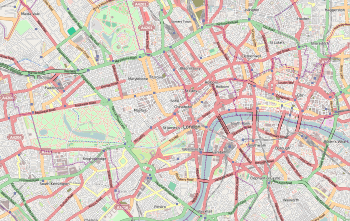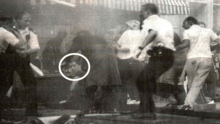Admiral Duncan (pub)
| Admiral Duncan | |
|---|---|
.jpg) The Admiral Duncan in 2012 | |
 Location within Central London | |
| Etymology | Admiral Adam Duncan |
| General information | |
| Address | 54 Old Compton Street, London, W1D 4UD |
| Coordinates | 51°30′46″N 0°07′57″W / 51.5129°N 0.1324°WCoordinates: 51°30′46″N 0°07′57″W / 51.5129°N 0.1324°W |
| Owner | Stonegate Pub Company |
The Admiral Duncan is a public house in Old Compton Street, Soho in central London that is well-known as one of Soho's oldest gay pubs. It is named after Admiral Adam Duncan, who defeated the Dutch fleet at the Battle of Camperdown in 1797. In recent history, the pub was the scene of a nail bomb attack carried out by a neo-Nazi, David Copeland, on 30 April 1999.
History
The Admiral Duncan has been trading since at least 1832. In June of that year, Dennis Collins, a wooden-legged,[1] Irish ex-sailor living there was charged with high treason for throwing stones at King William IV at Ascot Racecourse.[2] Collins was convicted and sentenced to be hanged, drawn and quartered, as the medieval punishment for high treason was then still in effect. However, his sentence was quickly commuted to life imprisonment.[1] and he was subsequently transported to Australia.[3] In December 1881 a customer received eight years penal servitude for various offences in connection with his ejection from the Admiral Duncan public house by keeper William Gordon.[4]
It was once in the ownership of the Scottish & Newcastle Brewery but was bought in 2004 by the Tattershall Castle Group, now known as TCG .
The exterior of the bar was repainted in a black and pink motif in late 2006. In late 2005, Westminster City Council decreed that the Admiral Duncan and all other LGBT (Lesbian Gay Bisexual Transgender) bars and gay businesses that operated in its jurisdiction, including those in Soho and Covent Garden, remove their pride flags claiming that such flags constituted advertising which was forbidden in its planning laws. Businesses would be required to apply for permits to be allowed to fly flags, but the businesses that applied for permission found their applications turned down for spurious reasons. Following media allegations of homophobia in the Council, the I Love Soho campaign and intense pressure from the Mayor of London, Ken Livingstone, the Council rescinded its directive, and Pride Flags were once again permitted to be flown.
Bombing
| Admiral Duncan pub bombing | |
|---|---|
| Part of 1999 London Nail Bombing Campaign | |
 A CCTV image, taken moments after the bomb exploded. Jonathan Cash, one of the survivors, is highlighted | |
| Date |
30 April 1999 6:37 pm |
| Target | Admiral Duncan pub |
Attack type | Nail bomb |
| Deaths | 3 |
Non-fatal injuries | approximately 70 |
| Perpetrators | David Copeland |
| Motive | Homophobia |
On the evening of 30 April 1999, the Admiral Duncan was the scene of a nail bomb explosion which killed three people and wounded around 70. The bomb was the third to be planted in a one-man campaign by a Neo-Nazi, David Copeland, who was attempting to stir up ethnic and homophobic tensions.[5]
Copeland's previous bomb attacks, on 17 April in Brixton, south London and on 24 April in Hanbury Street in Whitechapel, east London, had made Londoners wary. Although these had been described by the police as specifically race-hate attacks, they had issued a warning that a gay bar could potentially be the bomber's next target, and The Yard – another pub in the area – had displayed a poster warning customers to be alert.[6] On Thursday 29 April, CCTV footage from the Brixton attack was given wide publicity after an image of the suspected bomber was identified on it. This caused Copeland to bring forward his planned bombing of the Admiral Duncan to Friday evening. The unattended bag containing the bomb was noticed by patrons of the Admiral Duncan; however the bomb exploded at 6:37 pm,[7] just as the bag was being investigated by the pub manager, Mark Taylor.[6] Three people were killed, Andrea Dykes, 27, four months pregnant; her friend, Nik Moore, 31; and John Light, 32, the best man at the wedding of Andrea and her husband, who was himself seriously injured.[8] In total, around 70 people were injured.
Copeland was captured by the police on the same evening as the bombing. A work colleague of Copeland had recognised him from the publicised CCTV footage and alerted police about an hour and 20 minutes before the bomb exploded. Copeland was found later that night once the police obtained his address – a rented room in Cove, Hampshire. He immediately admitted to carrying out all three bombings and was arrested.
A large open air meeting was spontaneously organised in Soho Square on the Sunday following the attack, attended by thousands. Among the speeches was one from the Metropolitan Police Assistant Commissioner who undertook to maintain a crime scene van outside the pub to take witness statements and gather evidence until the perpetrator was found; the van would be staffed entirely with openly gay and lesbian police officers. This marked a turning point for the previously often tempestuous relationship between the LGBT community and the Metropolitan Police.
Copeland was convicted of three murders and three offences of planting bombs on 30 June 2000 and given six life sentences, one for each of these offences. His minimum sentence was 30 years, though the trial judge spoke of his doubt that it would ever be safe to release him. He was sentenced to be confined at Broadmoor Hospital.[9] On 2 March 2007, at a hearing at the High Court, Mr Justice Burton increased Copeland's minimum sentence to 50 years, stating this was "necessary for the protection of the public".[10] Copeland's release will not occur until 2049 at the earliest, when he will be 73 years old.
There is a memorial chandelier with an inscription and a plaque in the bar to commemorate those killed in the blast and the many who were injured, several very seriously; a number of people lost eyes or limbs.[6]
The playwright Jonathan Cash, then working for Gay Times,[6] was among the injured. He later used the experience as the basis for his play, The First Domino,[11] about a fictional terrorist being interviewed by a psychiatrist in a top-security prison.
Bar manager David Morley, who was also injured in the bombing, was murdered in London on 30 October 2004.[12]
See also
References
- 1 2 "High Treason". The Hull Packet and Humber Mercury (2493). Hull. 28 August 1832.
- ↑ "Traitorous Assault upon His Majesty". The Morning Chronicle (19606). London. 28 June 1832.
- ↑ Lowth, Cormac. "The One-Legged Sailor and the King". Inis na Mara. National Maritime Museum of Ireland. Retrieved 4 November 2012.
- ↑ Middlesex Sessions; The Times, 29 December 1881; pg. 10; col A.
- ↑
- 1 2 3 4 Simon Edge. "Look Back in Anger". Gay Times. Retrieved 2011-07-30.
- ↑ Jonathan Cash (30 April 2009). "Admiral Duncan bombing: The day my life changed forever". Pink News. Retrieved 2011-07-30.
- ↑ On this day; BBC News
- ↑ Hopkins, Nick. "Bomber gets six life terms", The Guardian, 1 July 2000.
- ↑ Attewill, Fred. "London nail bomber must serve at least 50 years", The Guardian, 2 March 2007.
- ↑ Emily-Ann Elliott (5 May 2009). "Bomb survivor writes Brighton play". The Argus. Retrieved 2011-07-27.
- ↑ "Soho nail bomb survivor murdered". The BBC. 1 November 2004. Retrieved 2009-02-01.